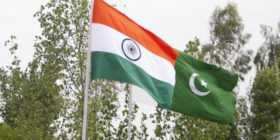Pakistan has expressed “serious concern” over India’s controversial draft Geospatial Information Regulation Bill, based on United Nations Security Council (UNSC) resolutions, but experts say there is no merit in the claim.
As per an official release, Pakistan’s foreign affairs ministry said they have sent letters to the United Nations Secretary General and the President of the UN Security Council expressing “serious concerns” over Indian government’s efforts to introduce the Geospatial bill in the Indian parliament.
“In violation of UNSC resolutions, the official map of India has been depicting the disputed territory of Jammu and Kashmir as part of India which is factually incorrect and legally untenable. Through the passage of this Bill, the Indian government would penalize the individuals and organizations who depict Jammu and Kashmir as a disputed territory as per the United Nations Security Council (UNSC) resolutions.” it said.
“While there are million different reasons why this regulation is something that will harm innovation is not in India’s best interests, international law is not one of them,” said Pranesh Prakash, policy director at Centre of Internet and Society.
“There is no violation of law that happens either through India depicting through official government sources a particular map, or by India telling others to depict such maps within India,” he added.
The Pakistani ministry has asked the United Nations to “uphold the UNSC resolutions and urge India to stop such acts which are in violation of international law.”
“We have urged the international community and the United Nations to fulfill their commitment with the people of Jammu and Kashmir by holding an independent and impartial plebiscite under UN auspices.” it added.
However, in 2010, Jammu and Kashmir was removed from the UNSC list of unresolved disputes under the observation of the Council.
However, in 2010, Jammu and Kashmir was removed from the UNSC list of unresolved disputes under the observation of the Council.
“Those resolutions don’t say anything about maps either. There is no requirement in international law that certain kinds of maps or boundaries be depicted anywhere and the Pakistani claim is utterly without basis,” said Prakash.
Earlier this month, Indian government had released a draft Geospatial Information Regulation Bill that said anyone mapping India by a satellite or aerial platform will need a licence from a government “security vetting authority”.
Non-compliance with these guidelines could land you in jail for seven years along with a a fine of up to Rs 100 crore. The bill is currently seeking public comments until June 4.
Last week, a volunteer-led initiative called SaveTheMap, had also drafted a template response users can send to the Ministry.
The response provides a list of the things that people will not be able to do if the Bill is passed, including being unable to geotag photos, social media posts, record my daily running, cycling, walking or driving activity with smartphone apps, share location with friends and others via smartphone apps like WhatsApp, food delivery apps, transport apps etc.
“This current draft will dissuade a strong ecosystem of innovation. Please reconsider this current draft in favour of a regulation policy that will encourage all Indians who need and use geospatial data in everyday lives and who work every day to create businesses that serve India,” the response adds.






Leave a reply